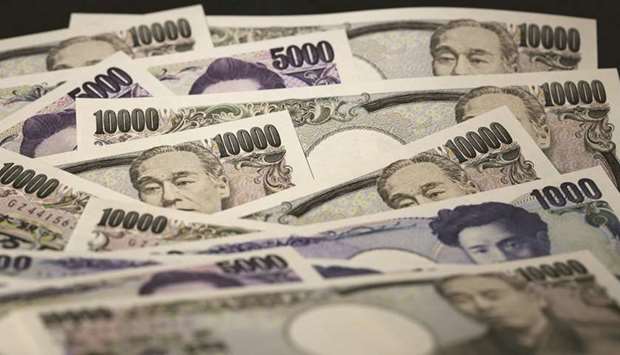A Federal Reserve yield-curve control policy would likely weigh on the dollar-yen, with the length of its target maturity dictating the pressure on the pair, according to Japan’s currency strategists.
Tokyo market players – long used to trading under a YCC regime – suspect the Fed will likely aim for the three-to-five year sector, where yields have modest room to decline. But a target further out the curve could weaken the greenback toward the 100 per yen level as investors react to the impact of increased dollar liquidity, higher fiscal spending and expected lower yields, they said in a series of interviews.
“Fixing the target at the medium-term zone will make it clear there is no upside to the dollar/yen,” said Daisuke Karakama, chief market economist at Mizuho Bank Ltd in Tokyo. “It will be more surprising if it’s set at 10 years, and the impact will be bigger to push the pair’s core range below 105 from 105-110 currently.”
Despite the slump in US yields this year, the yen is up just 1% against the greenback to around the 107.50 level, and slipped 0.4% in the second quarter. Volatility in the pair has settled down after significant swings during the jump in coronavirus fears in March.
Investors are debating whether the Fed will adopt a yield-curve control policy to help support the US economy – setting a target yield for a specific Treasuries maturity – later this year, with officials showing no readiness at their June meeting to commit to the strategy.
The Bank of Japan has used yield-curve control as part of its monetary stimulus programme since 2016.
Economists expect the Fed to target two- or five-year maturities should it implement YCC, a recent Bloomberg survey showed.
Here’s how Japanese strategists see the potential Fed move:
Dollar supply
Daisuke Karakama, chief market economist at Mizuho Bank in Tokyo:
* A $2.9tn stimulus that accounts for 15% of US gross domestic product means “there is no reason why the dollar should strengthen if there is so much of it out there”
* A YCC targeting short-to medium-term maturities leaves some scope for yields to fall
* “Yield-curve control will shrink volatility further and push the dollar/yen ever-more into ranges”
Marginal impact
Osamu Takashima, chief FX strategist at Citigroup Global Markets Japan:
* “Yield-curve control itself is a slightly dollar bearish factor as the target is assumed to be 3-to-5 years where there is some room for yields to fall”
* “Given the lack of dollar/yen sensitivity to interest-rate differentials now, the impact would be marginal” at one yen or so, as past cases show a 1% change in yields results in about a 10 yen move on average
* YCC may spark an adjustment in the valuation imbalance, as the dollar-yen around 107 now is too high in light of a US policy rate near zero
Target dependent
Minori Uchida, head of global market research at MUFG Bank:
* A YCC target of 10-year bonds could push the dollar-yen to below 100 by year-end – a target at five leaves limited room for yields to fall
* “It comes down to how the US draws in foreign funds. If it can’t offer higher yields, then it would need to appeal to investors with a cheap dollar. It is basically a factor for a weaker dollar and higher yen”
* There is also the risk of yen strength from stock market volatility if the target is set at about five years and its effectiveness is doubted
Long-run pressure
Kyosuke Suzuki, head of FX and money-market sales at Societe Generale’s Tokyo branch:
* “It’s unclear to what extent markets are pricing in YCC, but if it is implemented, it will be a surprise and will add to dollar selling pressure over the longer run”
* “It will add to the dollar selling trend which is becoming clear now and likely drive the dollar-yen below 105” as falling yields slow inflows to the US
* The 5-to-10 year curve is quite steep and targeting this zone will deliver a powerful impact
* Targeting 10 years won’t likely be a catalyst to pushing the dollar-yen below 100 and the Japanese currency could be sold if a low target sparks risk-taking momentum
Volatility focus
Yujiro Goto, head of foreign-exchange strategy at Nomura Holdings:
* YCC may be introduced in September and adoption itself is no surprise given market expectations
* Key is specifics of the framework such as whether the Fed would allow the 10-year yield to top 1% or cap it at that level
* Another focus is whether it will target a range like the BoJ, which aims for 10-year yields 20bps above and below zero
* While there is risk of YCC reducing volatility, the Fed is probably studying the BoJ which changed the band to boost trading. So there will be some moves in the dollar-yen.

Japanese yen banknotes of various denominations are arranged for a photograph in Tokyo. Despite the slump in US yields this year, the yen is up just 1% against the greenback to around the 107.50 level, and slipped 0.4% in the second quarter.
